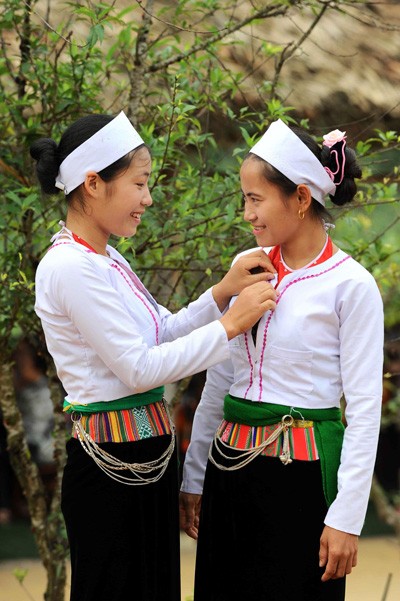(VOVworld) – The Muong culture is expressed in the group’s lifestyle, customs, and beliefs. The wedding ritual of the Muong in Hoa Binh shapes the formation and development of the family and clan.
The wedding ceremony of the Muong has been simplified in recent years but it still echoes the traditional ritual. In the past marriage was arranged by the parents and the children, particularly daughters, had no say in the matter. Now young boys and girls are free to date and choose their partners and marriage is voluntary.
The Muong spend several months, even a year, preparing for a wedding. Bui Van Ban of Dich Giao commune, Tan Lac district, Hoa Binh province, says: "The boy’s family will meet with all relatives to ask for their agreement on the marriage. Then we choose a prestigious man or woman to serve as matchmaker. The matchmaker brings two bottles of wine and a tea bag to the future bride’s family. After receiving the matchmaker the girl’s family holds a family meeting to accept the marriage or not.”
The matchmaker is an important figure who represents the bridegroom’s family in making the proposal and discussing preparations. The Muong maintain the custom of asking for wedding presents. The girl’s family normally expects the boy’s family to give a small buffalo, a basket of round sticky rice cakes with no filling to represent the bride’s virginity, some money as the marriage portion of the bride, about 60 liters of wine, 60 kg of rice, and a quantity of betel leaves and areca nuts.
 |
| Muong girls in their traditional costume |
The matchmaker informs the boy’s family of the girl’s request. If the boy’s family doesn’t agree, the matchmaker can try to negotiate a better deal for them. Bui Van Vien, a prestigious and well-spoken man in Dich Giao commune, is often invited to be a matchmaker. Vien says: “I was a matchmaker for many marriages over the past 20 years. I bring the offering of the boy’s family to the girl’s family and make a marriage proposal. The girl’s family will gather in full numbers to receive the matchmaker and listen to the boy’s family’s ideas. We discuss the wedding time and date and other preparations. I inform the boy’s family of the meeting and the wedding present and re-visit the girl’s family to confirm everything. The matchmaker is responsible for arranging everything smoothly.”
Normally the present is brought to the girl’s family one day prior to the wedding. But for the Muong Bi in Tan Lac district the groom, accompanied by a certain number of men, carries the present to the bride’s family on the wedding day. They are invited to stay to enjoy a meal with the bride’s family while the groom has to return home. Bui Van Ban again: “The wedding present must have betel leaves and areca nuts in addition to pigs, chicken, and some money for the bride.”
After welcoming the bride home, the groom’s family gives gifts to the matchmaker and people accompanying the bride and the groom. The Muong uphold the custom that the bride returns to her parent’s house for a couple of days before living with the groom’s family ever after.